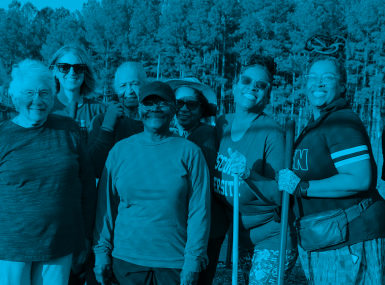Promoting civic engagement, from voting to volunteering
Author
Julia Haskins
Upcoming Events
Related News

Key Takeaways
When people contribute to the safety, well-being, and resilience of their communities, they are participating in something bigger than themselves; they are working toward a society that reflects their goals and values. Civic engagement — the actions carried out by residents to improve the quality of life in their communities — shapes health outcomes. Civically engaged community members enjoy boosts to their mental wellness and greater social connectedness, among other benefits.
County officials have deep ties across their communities, making them integral in setting the tone for civic engagement. Their influence goes a long way in promoting stronger, healthier communities, during election cycles and beyond.
Voting is a matter of health
Voting is one of the most powerful forms of civic engagement to drive community health improvements. As we near the 2024 U.S. presidential election, we are reminded of just how much voting matters to health. Voting puts critical policy decisions in the hands of people who are most affected by these choices, many of which have implications for public health. For example, a jurisdiction may vote on whether to implement policies for complete streets or healthy rental housing. These policies can impact generations of residents.
As the Health & Democracy Index shows, greater voting access and civic participation corresponds with better health outcomes. County officials can support residents in making their voices heard, considering how longstanding inequities have affected voting patterns. Decades of racist policies have barred many people of color and other historically marginalized groups from full participation in voting. Collaborating with non-partisan entities like health departments and community-based organizations serving underrepresented groups gives county officials insight into why voting access, education, or enthusiasm may be lacking among certain communities.
Conversations around voting can be especially fraught in presidential election cycles, pitting red versus blue voters. But research shows that concerns about many public health issues, from mental health to COVID safety, are shared by people across the political spectrum. County officials can help to steer conversations away from partisan divides to focus on joining people of all backgrounds. Rallying around improvements to community health is a unifying goal, regardless of political party affiliation.
The National League of Cities’ Cities Vote initiative offers resources including a list of interventions for voter turnout. Some recommendations from this list: deputize trusted local messengers, remove barriers to transportation, and pursue innovative partnerships.
Civic engagement takes many forms
As important as voting is to a fair and free democracy, it is far from the only way for residents to be civically engaged. County leaders can use their platforms to spread awareness of various opportunities for civic engagement and give residents a more active role in advancing community health.
Encourage connection in third places. Beyond their workplaces and homes, people yearn for the connectedness that third places foster. Recreation centers, places of worship, coffee shops, and gyms are just a few examples of third places where people can forge social connections. Use channels such as official county social media and newsletters to point residents to local third places and the activities and events they offer. When amplifying third places, highlight virtual means of social connection such as Facebook or NextDoor communities as well.
Promote opportunities for volunteering. There is no shortage of ways for people to get involved in their communities. While many people are probably familiar with volunteering at a food bank or homeless shelter, other nonprofits like schools, health departments, and libraries often need helping hands as well. (These organizations are often part of voting efforts during national and local election cycles.) For residents exploring their options, VolunteerMatch compiles local volunteer opportunities based on their interests and skill sets. Advise local organizations to make their volunteer opportunities publicly available on VolunteerMatch or other channels such as a county listserv.
Bring residents into decision making. For residents to be motivated to engage with their communities, they need to know that their leaders have their best interests in mind and are actively working to address problems. Creating this trust starts with increased transparency into government functions. Consider ways to meaningfully involve residents in decision making, such as holding regular forums, establishing a citizens’ advisory board, or inviting public comments on initiatives with implications for community well-being. Be receptive to and act on feedback.
Civic engagement is often framed in terms of one-time participation: casting a vote for president every four years, donating to a food bank during the holidays, or picking up trash on the street. But being civically engaged is an ongoing commitment to one’s community grounded in a desire to serve a greater purpose. County leaders have an important role in facilitating acts of civic engagement, helping residents create communities that promote and protect health for all.
Related News

Announcing 2025 NACo Achievement Award Winners
NACo is pleased to announce the winners for the 2025 Achievement Awards. Through a non-competitive application process, noteworthy programs receive awards in 18 categories that cover a vast range of county responsibilities.

America’s Counties Recognize April 2025 as National County Government Month
America’s Counties this month are joining the National Association of Counties (NACo) in recognizing National County Government Month (NCGM). Throughout April, counties will honor the county workforce, educate residents about local programs and services and celebrate the county role in the intergovernmental partnership.

Celebrate 2025 National County Government Month
Join us in celebrating National County Government Month (NCGM) 2025! Since 1991, NACo has encouraged counties to utilize NCGM to actively promote county roles and responsibilities in serving residents.
Webinar
Five Keys to Enhancing Civic Engagement: Meeting Diverse Community Needs with 21st-Century Solutions
With only 41% of citizens satisfied with their government’s information-sharing practices and the needs of communities becoming more diverse, civic engagement can be a huge challenge. Luckily, there is a modern approach.
During this webinar, we’ll unpack 5 actionable steps to enhance civic engagement. The communities around the country that are employing these keys are experiencing an engaged community like never before.
Webinar Agenda:
- Civic engagement statistics
- 5 keys to enhance your civic engagement
- Success stories from your peers
